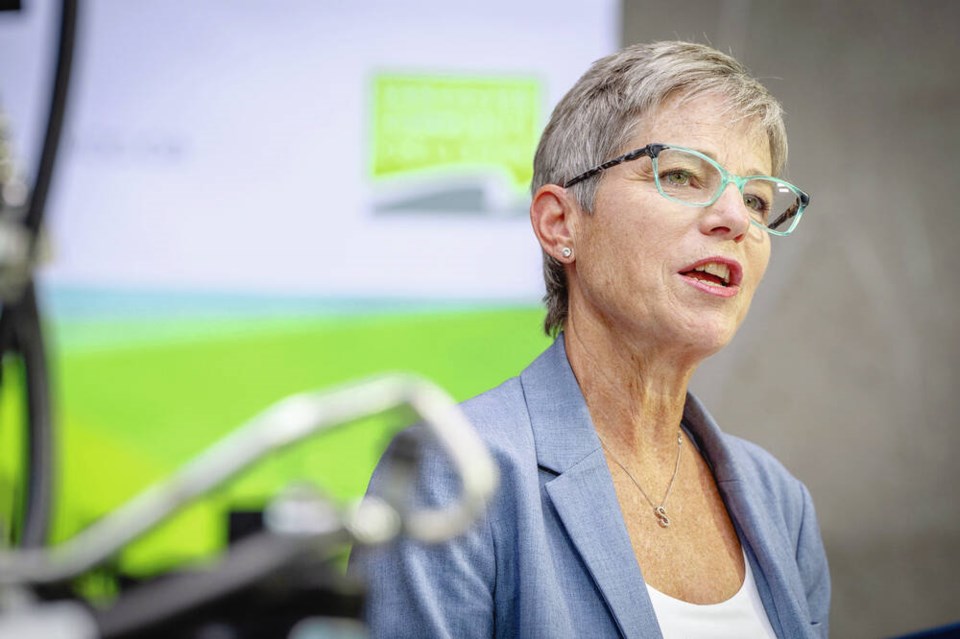Private colleges and universities in B.C. will face greater scrutiny, must be more transparent with tuition fees and prove that new programs meet labour market demands as part of a provincial government crackdown announced Monday to rein in so-called “diploma mills” that collect high fees from international students while offering a poor education.
The B.C. NDP government, however, had few details on how the government will carry out the enhanced inspections and the extent to which B.C.’s 280 private colleges will have to shrink their student enrolment to meet the federal government’s two-year cap on international students.
“We do need to stop the bad actors from misleading these students,” Post-Secondary Education Minister Selina Robinson said Monday morning during a news conference in Surrey.
The new rules, Robinson said, will prevent institutions from taking advantage of international students, some of whom arrive in B.C. to find the campus consists of a small office in a strip mall and most of the classes are online.
Private post-secondary institutions can expect to see more frequent inspections to ensure schools meet certain quality standards and that students have access to housing and social supports. Currently, private colleges and universities can be inspected after someone files a complaint.
Robinson didn’t have details on whether the province would hire more people to carry out inspections. Currently, institutions can receive a red flag if they’ve been found to violate the Private Training Act and sanctions include a compliance order, administrative penalty or have their certificate to operate suspended or cancelled.
According to enforcement data from the Private Training Institutions Branch, which is responsible for overseeing private colleges, two colleges lost their certification and were ordered to shut down in 2023 for repeated violations, and three were suspended. The branch issued 16 administrative penalties and 16 compliance orders.
The new rules will also require institutions to clearly post their tuition and prove that their students meet minimum language requirements set by the province.
Private degree programs will need to meet higher standards for approval and prove there’s a demonstrated labour market need for the skills being taught.
Manpreet Kaur, chairperson of the Alliance of B.C. Students, said the B.C. government didn’t address what will happen to existing international students if their private college is shut down for not meeting the new criteria.
“It’s definitely very stressful for students who are here,” Kaur said.
She called on the province to cap the tuition fees for international students, similar to the two-per-cent-a-year cap for domestic students, to prevent existing students from carrying the brunt of the financial burden.
Robinson also announced that no new private colleges will be approved in the next two years. The vast majority of the about 280 private colleges and universities are in Metro Vancouver.
The federal government’s international student cap will mean a 35 per cent reduction in new undergraduate study visas this year, which means 360,000 students from abroad will be granted study permits this year. In provinces with a higher proportion of international students, like B.C. and Ontario, the reduction could be closer to 50 per cent.
The federal government on Saturday night told the B.C. government the number of international students it’s able to accept. The number hasn’t yet been released but Premier David Eby told CBC’s Rosemary Barton over the weekend that the number concerns him.
Neither Eby nor Robinson would disclose the number when asked on Monday but said both said they’ve been talking to federal Immigration Minister Marc Miller about excluding certain in-demand professions, such as health-care workers, child-care workers and skilled labourers, from the caps.
“I do think that there’s a role for the province to play here in supporting the federal government’s goal, which we share, of reducing the overall numbers,” Eby told reporters during a media availability in Ottawa.
However, he said the reductions should be done “in a way that minimizes harm to the overall provincial economy, post-secondary institutions, to international students themselves and maximizes the benefits of why we’ve always supported a strong international student program in British Columbia.”
The province will also set new maximum international student enrolment levels for public post-secondary institutions, such as for the University of B.C., Simon Fraser University and the University of Victoria.
B.C. Federation of Students chairwoman Melissa Chirino said she’s happy to see measures that will reduce the exploitation of international students and provide transparency around tuition fees.
However, the federation is concerned about how a dramatic reduction in international students will impact the financial stability of post-secondary institutions, “which have become overly dependent on international student tuition fees as a revenue stream due to decades of systemic underfunding of the public post-secondary system.”
International undergraduate students pay $36,123 on average for tuition, compared with $6,834 for Canadian undergrads, according to Statistics Canada.
The federation noted that in 2000, provincial funding made up 68 per cent of institutional operational revenue compared with 2023 when provincial funding made up 40 per cent. The federation called for the province to invest an additional $500 million a year in public post-secondary institutions.
B.C. has more than 175,000 international post-secondary students, 82,000 of which are at public colleges and universities and 94,000 at private institutions.
Based on population, the federation estimated B.C. will receive somewhere between 45,000 and 50,000 study permits.
B.C. has the second highest number of international students in the country after Ontario.
The number of international students in B.C. has increased by more than twofold since 2013 when there were 78,000 students from abroad.



